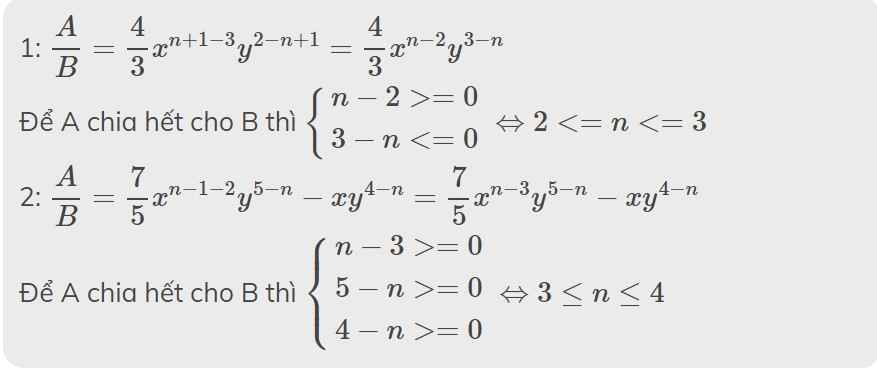Hãy nhập câu hỏi của bạn vào đây, nếu là tài khoản VIP, bạn sẽ được ưu tiên trả lời.

\(n^3+100=n^2.\left(n+10\right)-10n^2+100\)
\(=n^2.\left(n+10\right)-10n.\left(n+10\right)+100n+100\)
\(=n^2.\left(n+10\right)-10n.\left(n+10\right)+100.\left(n+10\right)-900\)
\(=\left(n+10\right).\left(n^2-10n+100\right)-900\)
Để n3+100 chia hết cho n+10 => -900 chia hết cho n+10 => n+10 thuộc Ư(900)
Vì n lớn nhất => n+10 lớn nhất => n+10=900 => n=890
Vậy n=890
Xét a là một số tự nhiên bất kỳ. Dễ thấy, nếu a chia hết cho 3 => a3 chia hết cho 9 (1)
Xét: \(a\equiv1\left(mod9\right)\Rightarrow a^3\equiv1\left(mod9\right)\)(2)
\(a\equiv2\left(mod9\right)\Rightarrow a^3\equiv8\left(mod9\right)\)(3)
\(a\equiv4\left(mod9\right)\Rightarrow a^3\equiv64\equiv1\left(mod9\right)\)(4)
\(a\equiv5\left(mod9\right)\Rightarrow a^3\equiv125\equiv8\left(mod9\right)\)(5)
\(a\equiv7\left(mod9\right)\Rightarrow a^3\equiv343\equiv1\left(mod9\right)\)(6)
\(a\equiv8\left(mod9\right)\Rightarrow a^3\equiv512\equiv8\left(mod9\right)\)(7)
Từ (1),(2),(3),(4),(5),(6),(7) => lập phương của 1 số nguyên bất kỳ khi chia cho 9 có số dư là 0,1,8
Dễ thấy: để a3+b3+c3 chia hết cho 9 => 1 trong 3 số a,b,c hoặc cả 3 số a,b,c phải chia hết cho 3 =>
=> abc chia hết cho 3. Vậy a3+b3+c3 chia hết cho 9 thì abc chia hết cho 3

a) 5x - 15y = 5(x - 3y)
b) \(\dfrac{3}{5}\)x2 + 5x4 - x2 - y
= \(\dfrac{3}{5}\)x2 + 5x2.x2 - x2 - y
= x2(\(\dfrac{3}{5}\) + 5x2 -1) - y
c) 14x2y2 - 21xy2 + 28x2y
= 7xy.xy - 7xy.3y + 7xy.4x
= 7xy(xy - 3y + 4x)
= 7xy[(xy - 3y) + 4x]
= 7xy[y(x - 3) +4x]
d) \(\dfrac{2}{7}x\)(3y - 1) - \(\dfrac{2}{7}y\)(3y - 1)
= (3y - 1).(\(\dfrac{2}{7}x\) - \(\dfrac{2}{7}y\) )
= (3y - 1).[\(\dfrac{2}{7}\)(x - y)]
e) x3 - 3x2 + 3x - 1
= x2.x - 3x.x + 3.x - 1
= x(x2-3x+3) - 1
g) 27x3 + \(\dfrac{1}{8}\)
= (3x)3 + \(\left(\dfrac{1}{2}\right)^3\)
= (3x + \(\dfrac{1}{2}\)).(9x2 - \(\dfrac{3}{2}\)x + \(\dfrac{1}{4}\))
h) (x+y)3 - (x-y)3
= 2(3x2y) + 2y3
f) (x+y)2 - 4x2
= -3x2 + y(2x + y)

a, 2x3 / xn+1
= 2/x3-n+1
= 2/x2-n
Để 2x3 chia hết cho xn+1 thì 2-n \(\ge\)0 <=> n \(\le\)2
b, ( 5x3 - 7x2 + x ) / 3xn
= 5/33-n - 7/32-n + 1/31-n
Để ( 5x3 - 7x2 + x ) chia hết cho 3xn thì 3 - n \(\ge\)0
2 - n \(\ge\)0
1 - n \(\ge\)0
<=> n \(\le\)3
n \(\le\) 2
n \(\le\) 1
<=> n \(\le\)1
Còn lại tương tự nha!
c, ( 13x4y3 - 5x3y3 + 6x2y2 ) / 5xnyn
d, ( 5x3 - 7x2 + x ) / 5xnyn
e, ( 13x4y3 - 5x3y3 + 6x2y2 ) / 5xnyn

Bài 2:
\(=\dfrac{x^2\left(x^2+4\right)-2x\left(x^2+4\right)}{x^2+4}=x^2-2x\)
Bài 1:
a: \(=\left(\dfrac{2}{3}:\dfrac{-1}{9}\right)\cdot x^4y^2z^6=-6x^4y^2z^6\)
b: \(=-12x^8-21x^5\)
c: =x^3+8
d: \(=125x^3-75x^2+15x-1\)

1: \(\dfrac{A}{B}=\dfrac{4}{3}x^{n+1-3}y^{2-n+1}=\dfrac{4}{3}x^{n-2}y^{3-n}\)
Để A chia hết cho B thì \(\left\{{}\begin{matrix}n-2>=0\\3-n< =0\end{matrix}\right.\Leftrightarrow2< =n< =3\)
2: \(\dfrac{A}{B}=\dfrac{7}{5}x^{n-1-2}y^{5-n}-xy^{4-n}=\dfrac{7}{5}x^{n-3}y^{5-n}-xy^{4-n}\)
Để A chia hết cho B thì \(\left\{{}\begin{matrix}n-3>=0\\5-n>=0\\4-n>=0\end{matrix}\right.\Leftrightarrow3\le n\le4\)